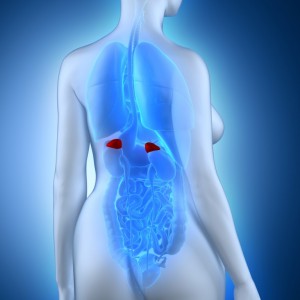
Adrenal Fatigue or HPA Axis Dysfunction
What is Adrenal Fatigue?
Are you a type-A personality? A high achiever? SuperMom? Do people wonder how you can do so much in a day? Or how do you do so many things so well? Are you under lots of stress? You may be at risk of (or are already experiencing signs of) adrenal fatigue. It is also known in medical circles as HPA axis dysfunction.
Adrenal fatigue or HPA axis dysfunction is where your adrenal glands are not working correctly. It may be that the gland is lacking vital nutrients. It may be that it is not receiving the correct messages from your pituitary gland. The pituitary gland in your brain tells the other glands what to do. Together with the hypothalamus, it regulates all of your organs.
What are the adrenal glands?
You have never heard of the adrenal glands, you say? Well, you’re not alone. 90% of the patients I see with adrenal fatigue or HPA axis dysfunction have never heard of them. Why is that? Because your adrenal glands are one of your body’s most overworked yet overlooked glands. They are equally important as the other endocrine glands, like your thyroid, but they are largely ignored.
Your adrenal glands sit on top of your kidneys. They perform a variety of functions, mainly those that relate to stress. The adrenal glands secrete a variety of hormones that regulate:
- Your blood pressure
- Cardiovascular functions such as your heart rate
- Immune response and inflammation
- Sex hormones
- Your blood sugar
- The part of your nervous system that prepares you to fight or run when you are in danger. Your “fight or flight” response.
- The part of your nervous system that helps you relax, rest and digest your food
What are the symptoms of adrenal fatigue or HPA axis dysfunction?
The symptoms of adrenal fatigue include:
- Tiredness, despite getting enough sleep
- Insomnia or sleep difficulties, particularly waking throughout the night and having difficulty going back to sleep.
- Hypoglycemia (drops in your blood sugar) if you don’t eat regularly
- Feeling weak, shaky, irritable or lightheaded if you don’t eat regularly
- Hormonal imbalance or infertility
- Anxiety or inability to cope with stress
- Poor digestion or irritable bowel syndrome
- Allergies, asthma, eczema
- Inflammatory or auto-immune conditions
- Mood disorders, including depression and bipolar disorder
What are adrenal gland tests?
Tests for adrenal gland insufficiency include:
DHEAs
DHEAs is a weak male-type hormone or androgen that your adrenal glands produce. It is a building block for testosterone and, in turn, estrogen. It also helps with energy and libido. DHEAs acts to moderate estrogen. A blood test measures DHEAs.
Testosterone
Testosterone is a more potent male hormone that your adrenal glands help to produce. It helps with energy, drive, motivation, and libido. Testosterone is also a building block for estrogen. A blood test measures testosterone.
Cortisol Test
This blood test is usually drawn in the morning, around 8-9 a.m. and sometimes also in the evening, around 6-8 p.m. Or, you may collect a saliva sample for cortisol at 4 points throughout the day. Cortisol is a stress hormone. High cortisol causes weight gain. But you need enough cortisol to convert fat, protein, and starch to energy. It also helps with normal blood pressure. It is normal to have a sharp spike in cortisol when you wake up. This is referred to as the Cortisol Awakening Response.
Aldosterone
Aldosterone is a hormone that helps to manage salt and water balance. It regulates your blood pressure. A blood test measures your aldosterone level.
ACTH
Your pituitary releases Adrenocorticotrophic hormone (ACTH). It is a hormone that stimulates your adrenal glands. A blood test measures your ACTH level.
Natural treatment for adrenal gland problems
Not surprisingly, every culture has its herbs for the adrenal glands. These are known as adaptogens. They are herbs that help your body adapt to and deal with stress more efficiently. Well-known adaptogens include ginseng, Rhodiola, Ashwagandha, Schisandra, and skullcap. In addition to helping support your adrenals with adaptogens, I always recommend replenishing the most essential nutrients for normal adrenal gland function. You need vitamin C, vitamin B5, vitamin B6, zinc, and magnesium for healthy adrenal function.
What are the benefits of natural treatment for your adrenal fatigue?
How can supporting your adrenal glands help you? Because these small but mighty glands are involved in so many body functions, enabling them can help you with:
- Better energy
- Better ability to cope with stress
- Less anxiety and depression
- Better blood pressure
- More stable blood sugar
- Reduced inflammation
- Better hormone balance
- Improved digestion
- Better mood
Book an appointment here or call the office for more information at 416-481-0222.
Authored by Dr. Pamela Frank, BSc, ND
Dr. Pamela has practiced as a naturopathic doctor in Toronto since 1999. She has received numerous “Best Naturopath in Toronto” awards. She is registered with the College of Naturopaths of Ontario.
Dr. Pamela Frank uses a natural treatment approach that may include acupuncture, herbal medicine, nutrition, diet, vitamins, supplements, and other natural remedies to restore balance and provide long-term resolution to almost any health problem.
Adrenal Gland and HPA Axis Research
HPA Axis and Bipolar Disorder
Bipolar disorder is associated with dysfunction of HPA axis activity. Targeting HPA axis dysfunctions might be a novel strategy to improve the outcomes of bipolar disorder.
Psychoneuroendocrinology. 2016 Jan;63:327-42. doi: 10.1016/j.psyneuen.2015.10.014. Epub 2015 Oct 21.
The HPA axis in bipolar disorder: Systematic review and meta-analysis.
Belvederi Murri M1, Prestia D2, Mondelli V3, Pariante C3, Patti S2, Olivieri B2, Arzani C2, Masotti M2, Respino M2, Antonioli M4, Vassallo L2, Serafini G2, Perna G5, Pompili M6, Amore M2.
Depression and HPA axis dysfunction
Studies demonstrate HPA axis overactivity in major depression, a relationship of HPA axis activity to cognitive performance, and a potential role of HPA axis genetic variation in cognition.
Mol Psychiatry. 2017 Apr;22(4):527-536. doi: 10.1038/mp.2016.120. Epub 2016 Aug 16.
HPA axis in major depression: cortisol, clinical symptomatology, and genetic variation predict cognition.
Keller J1, Gomez R1,2, Williams G3, Lembke A1, Lazzeroni L1, Murphy GM Jr1, Schatzberg AF1.
Cortisol, Depression, Anorexia and Sleep Apnea
Depression, anorexia nervosa, and obstructive sleep apnoea, are associated with increased cortisol exposure. Higher nighttime cortisol exposure is observed in patients with Cushing’s syndrome. High night cortisol is associated with insulin resistance and increased cardiovascular risk and mortality. A decrease in cortisol rhythm amplitude is seen in adrenal insufficiency, and despite replacement, patients have an impaired quality of life and increased mortality.
Best Pract Res Clin Endocrinol Metab. 2017 Oct;31(5):459-473. doi: 10.1016/j.beem.2017.10.011. Epub 2017 Nov 2.
Human studies on hypothalamic-pituitary-adrenal (HPA) axis.
Liyanarachchi K1, Ross R2, Debono M3.
